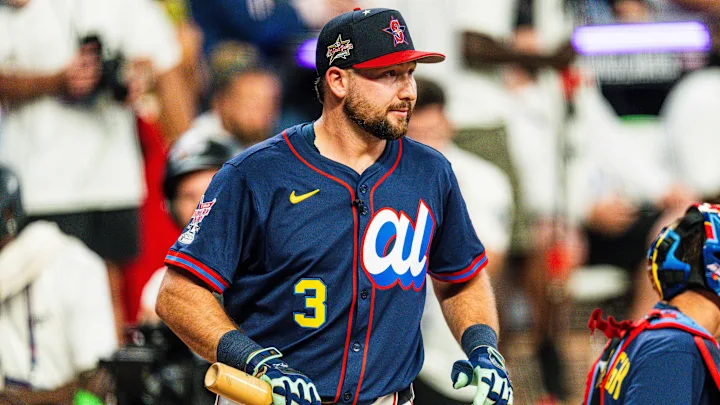Sports
2025 MLB Trade Deadline Breakdown: Passan’s Awards Reveal Winners, Losers, and Power Moves
1. Oakland’s Blockbuster: A’s Snag Leo De Vries, Win the Deadline
In a deadline lacking traditional star-level blockbusters, the Oakland Athletics defied expectations by pulling off what Jeff Passan called the most daring move of the 2025 MLB trade season. They landed Leo De Vries, an 18-year-old Dominican infielder ranked No. 3 on ESPN’s top prospect list, in exchange for dominant closer Mason Miller and left-handed starter JP Sears. The deal sent shockwaves through the league, as top-five prospects almost never move during the trade deadline. De Vries, often described as a potential franchise cornerstone with elite contact skills and defensive range, is now the centerpiece of Oakland’s rebuild.
For a franchise routinely criticized for cost-cutting, the A’s suddenly flipped the narrative. In pairing De Vries with recent breakout players like Brent Rooker and Nick Kurtz, the organization is signaling a commitment to building around youth and long-term upside. Passan labeled this “The Best Deadline Belonged to a Dealer Award,” praising GM David Forst for executing a high-risk, high-reward trade that could define the team’s identity for years. The reaction around the league was near-universal astonishment. “You don’t get top-three guys for relievers,” one rival scout told ESPN. “That’s a steal.”
Not since the White Sox landed Yoán Moncada in the 2016 Chris Sale deal has a prospect of this caliber changed hands at the deadline. The Padres, for their part, hope Miller’s dominance in the bullpen can bolster their playoff push this year. But it’s the A’s who came away with a potential superstar—and the boldness to go get him.

2. Mariners Cook Without Burning the Future
If the A’s shocked with boldness, the Seattle Mariners earned praise for precision. Their approach earned them the “Joël Robuchon Award for Absolutely Cooking” from Passan, referencing the famous French chef known for meticulous execution. The Mariners managed to add valuable pieces—slugger Josh Naylor, bullpen lefty Caleb Ferguson, and a reunion with third baseman Eugenio Suárez—without parting with any of their top-five prospects, including Colt Emerson, Harry Ford, and Tai Peete.
That’s no small feat in an environment where pitching costs were sky-high. Naylor, who brings both power and defensive flexibility at first base and corner outfield, addresses a glaring offensive need. Ferguson offers a proven late-inning option, and Suárez provides power, veteran leadership, and comfort for a clubhouse already familiar with him. Seattle improved without gutting its farm system—a win in both the short and long term.
GM Justin Hollander’s discipline in targeting value without overpaying could have major October implications. The Mariners have hovered in contention in the AL West and are positioning themselves to challenge not just for a Wild Card, but a division crown. With Julio Rodríguez, George Kirby, and Logan Gilbert forming the core, these deadline additions boost Seattle’s depth and confidence entering the stretch run. Passan’s conclusion was simple: the Mariners “cooked,” and they did it without spilling a single drop of elite prospect sauce.
3. Twins’ Full Reset: 10 Deals, One Message
No team turned over their roster more completely than the Minnesota Twins, who dealt 10 players from their big-league roster in what Passan dubbed the “Juggling Octopus Award.” Headliners included shortstop Carlos Correa, closer Jhoan Durán, outfielder Harrison Bader, and utility man Willi Castro. In return, they amassed an impressive array of prospects—among them catcher Eduardo Tait, pitchers Taj Bradley and Mick Abel, and 20-year-old Cuban standout Kendry Rojas.
While Twins fans were initially stunned—especially by the loss of Correa, whose massive contract and leadership defined the team’s recent run—there was method to the madness. The front office appears to be banking on a change in ownership and a longer-term rebuild. By moving salary and high-profile veterans, they’ve cleared both payroll space and positional opportunities for younger players to emerge in 2026 and beyond.
Critics were divided. Some called it “baseball malpractice,” arguing that the team wasn’t far from contention and should’ve added, not subtracted. Others praised the courage to commit fully to a reset instead of half-measures. Passan’s metaphor of an octopus juggling 10 flaming torches captured the chaos and complexity of the day—one that may define the Twins for the next five years.
4. Cubs and Red Sox Miss the Moment
While some teams seized opportunity, others fumbled it. Passan awarded the “Pittsburgh Pirates Award for Frustrated Fan Base” to the Chicago Cubs and Boston Red Sox, two storied franchises that approached the deadline with ambition but ultimately delivered disappointment. Both aimed for controllable starting pitching—Chicago reportedly targeted Miami’s Edward Cabrera, while Boston was deep in talks with Minnesota for Joe Ryan.
Neither team closed a deal. The Cubs did manage to acquire veteran Michael Soroka from the Braves, but the move was widely seen as underwhelming for a team in playoff position. Boston made no significant moves, and its pursuit of Ryan collapsed as front-office hesitancy combined with prospect cost concerns. The result? A status quo that may not be enough to keep pace in hyper-competitive playoff races.
Frustrated fans took to social media, criticizing the lack of urgency from front offices. Both organizations have faced questions about direction in recent years—Boston for seemingly inconsistent rebuilding and contention windows, Chicago for a cautious approach despite a strong farm. The 2025 trade deadline amplified those tensions. As Passan noted, inaction can be as costly as poor decisions, and the clock is ticking on both clubs to make good on promising young cores before windows close.
5. Bullpen Armageddon: October Runs Built in the Pen
As the deadline dust settled, a trend emerged: contenders prioritized bullpen firepower above all else. Passan handed out the “October Is for Relievers Award” to the Mets, Yankees, and Phillies—teams that spent their chips on high-leverage arms rather than flashy bats or frontline starters. The New York Mets landed flamethrowers Ryan Helsley and Tyler Rogers, while the Yankees loaded up with Camilo Doval, David Bednar, and Jake Bird. The Phillies grabbed perhaps the most electric arm of the bunch, acquiring Jhoan Durán from Minnesota.
These moves reflect a modern postseason reality. With starters rarely going beyond five innings in October, managers now lean heavily on multi-inning relievers and matchup specialists. The Dodgers and Astros have won recent titles with bullpen depth leading the way. This year, New York and Philadelphia are betting that dominant bullpens will be the difference in October dogfights.
Each of these relievers brings elite stuff and postseason experience. Helsley boasts a triple-digit fastball. Doval and Bednar have closed games in pressure-packed NL battles. Durán might be the most unhittable of them all. For teams with already-solid rotations, these additions offer flexibility, stability, and a safety net when stakes are highest.
From: Teetopiaworldus
